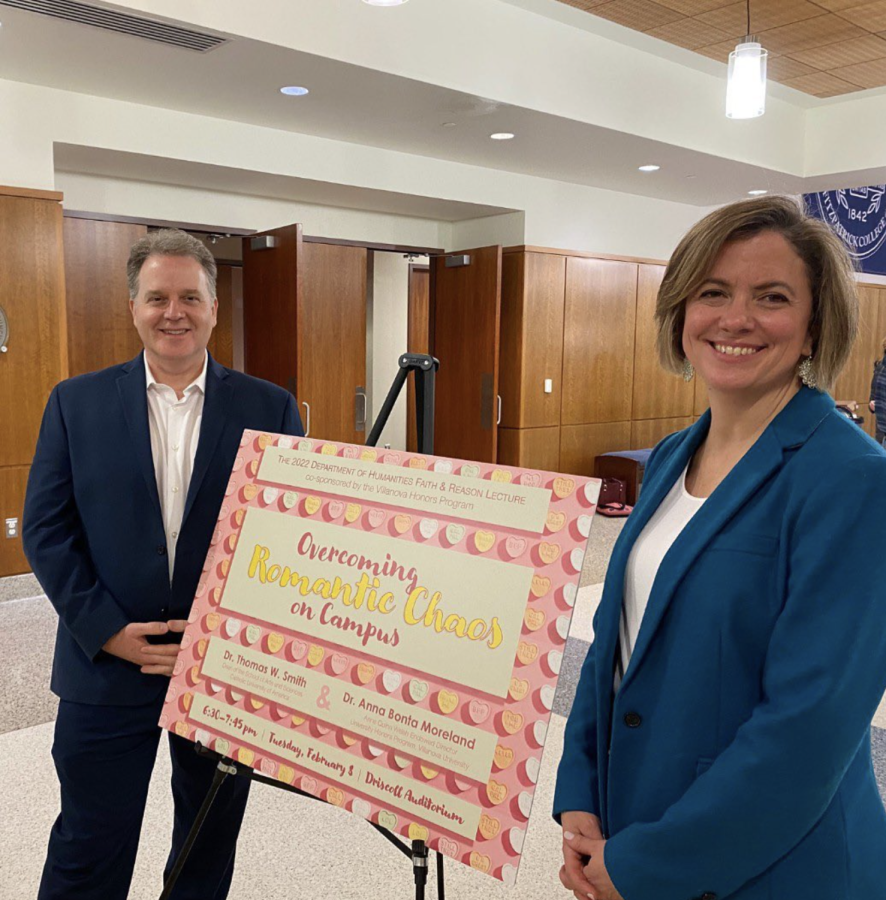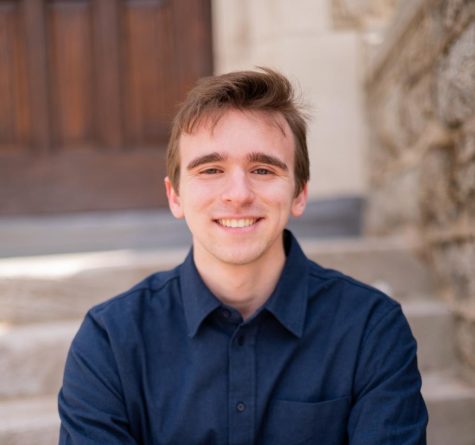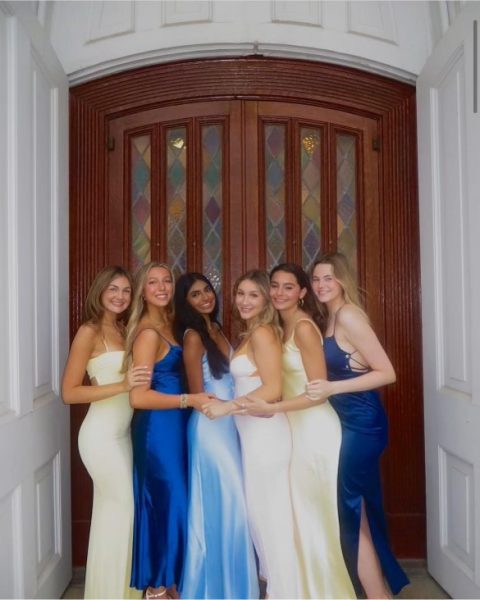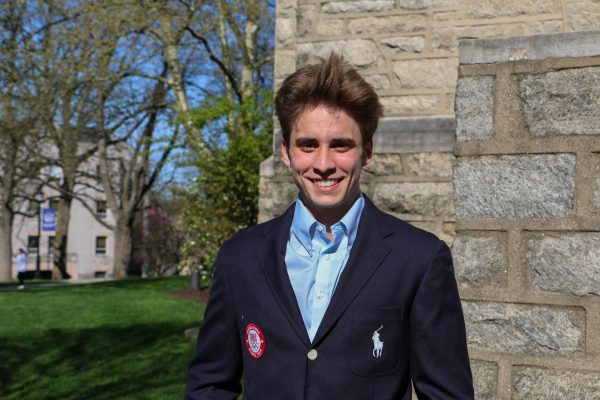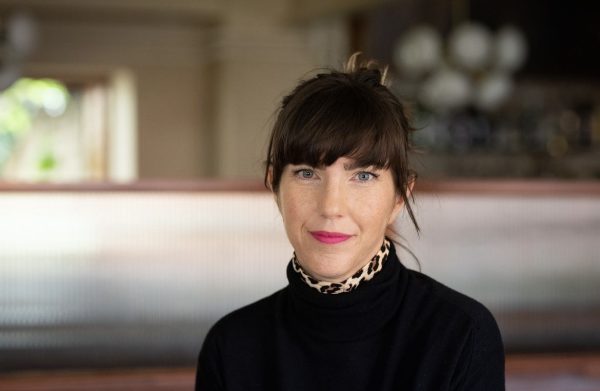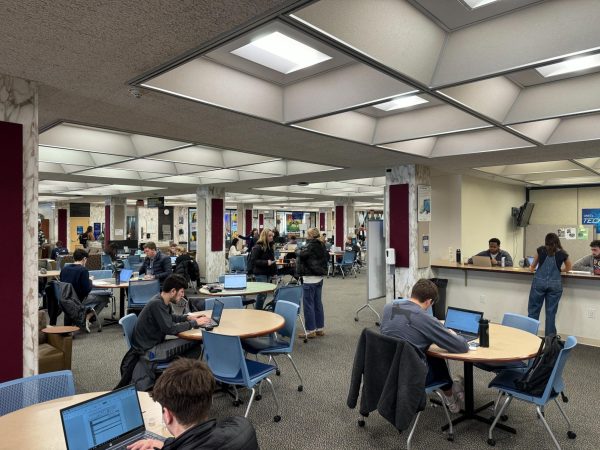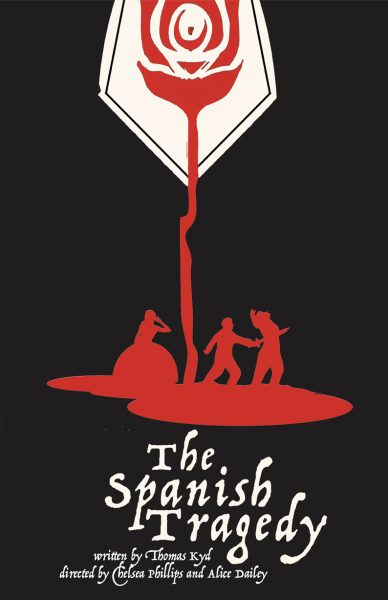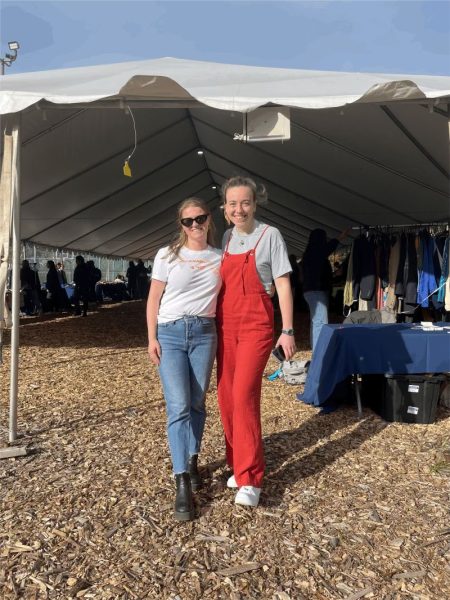Overcoming Romantic Chaos on Campus: Humanities Department Hosts 2022 Faith and Reason Lecture
Dr. Thomas W. Smith and Dr. Anna Bonta Moreland gave their lecture at Driscoll Auditorium on Feb. 8.
February 16, 2022
Valentine’s Day just passed by once again, and as usual, the campus (and social media feeds) seemed to be filled with people that are settled with their special someone. Yet, the reality is that most students struggle to get a date, let alone find serious relationships. On Tuesday, Feb. 8, the Humanities Department’s 2022 Faith and Reason Lecture sought to tackle this issue.
The event was held at Driscoll Auditorium with nearly 200 attendees and was hosted by Dr. Anna Bonta Moreland and Dr. Thomas W. Smith. Moreland is the Anne Quinn Welsh Endowed Director of the University’s Honors Program, and Smith is the former Honors Program Director, the founding chair of the University’s Humanities Department and the current Dean of the School of Arts and Sciences at The Catholic University of America.
The topic of this year’s lecture was “Overcoming Romantic Chaos on Campus.” The lecture material was drawn from the final chapters of Moreland and Smith’s forthcoming book, “Majoring in Life: The Complete Guide to Adulting,” which tackles three facets of life central to the young adult: work, leisure and romance.
“The romance chapters are at the end of the book because everyone wants to get there,” Moreland said. “There’s a layering effect in the book. You are asked to move deeper into yourself in each of the sections, so there’s a kind of growth throughout the reading process.”
The book has been in progress for the past four years and is expected to be released sometime next year.
Moreland and Smith have already lectured together at The Catholic University of America and separately at institutions like Princeton University, but Feb. 8 marked their first joint lecture about romance at Villanova.
The lecture was introduced by senior Humanities major Olivia Pfeiffer. Pfeiffer took Moreland’s “Introduction to Theology” class in Spring 2019 and her “Shaping an Adult Life” class this past fall.
“Dr. Moreland and Dr. Smith have both been such positive influences in my life during my time at Villanova, so it was such an honor and a privilege to introduce them,” Pfeiffer said.
In “Shaping an Adult Life,” Pfeiffer and her classmates offered feedback and personal testimonials for Moreland and Smith’s book, and in “Introduction to Theology,” Pfeiffer was one of the many students impacted by Moreland’s well-known “dating assignment.”
Over the past few years, Moreland has offered her classes an extra credit “dating assignment,” inspired by that of Boston College’s Kerry Cronin. The rules are simple: ask someone out (in-person) to a brief lunch or coffee date. Once at the date, avoid close contact with the person beyond an A-frame hug and avoid telling more than two people about the experience.
For some, the assignment has been a resounding success. Pfeiffer is still with the man who asked her out for the assignment three years later.
Following Pfeiffer’s introduction, Moreland and Smith took the stage and began the lecture by offering a series of interactive polls to the audience about the college sex and dating scene.
It turns out that popular assumptions do not correspond to reality: young people are having less sex and less romance than ever. Only 25% of 18-29 year olds had more than one sexual partners over the course of a year.
Still, hook-up culture is leaving a mark. The assumption that hook-up culture is dominant ends up intimidating or disillusioning many young people, who then “opt out” of dating entirely.
“Most people think that the hook-up culture is much more prevalent than it is,” Smith said. “This shapes your imagination about romantic love and relationships. You think everybody is hooking up, but actually very few people are.”
“There are two kinds of options on the table when you show up at college: hooking up and opting out,” Smith continued. “You think that everybody is hooking up. But actually, everybody is opting out.”
The lecturers identified three key factors playing into the modern phenomenon of “opting out.”
“The epidemic of loneliness, fear of rejection and choice paralysis are three markers of your generation,” Moreland said.
These markers, heightened by technology and a hyperactive participation culture, cause young people to shut themselves off to other people.
Moreland and Smith illustrated these issues through the metaphor of a house. Those that are hooking up prematurely invite strangers into the bedroom, but have a hard time getting them back down to the kitchen. However, more commonly, those that are opting out don’t invite passerbys into the house at all.
“If your house is a fortress, you will always be invulnerable,” Smith said. “You will always have your heart guarded. But, you won’t be in love.”
Yet, Moreland and Smith did not stop short at merely diagnosing the problem. They offered a series of advice to get students to start allowing others onto their metaphorical porch – in other words, to risk rejection and take a chance at love.
The five steps for a successful relationship are as follows: try it, name it, let it breathe, support it and plan for it.
Most students are stuck at the try it phase. For these students, Moreland and Smith recommend forcing oneself to face their fears and to ask someone out in person.
“We encourage at the ‘try it’ phase for you to ask in person,” Moreland said. “Which is hard, but it’s what big people do. Why? Because it’s human. But it’s also harder to get rejected in person. If you just text someone, it’s really easy to get that ‘no.’”
The “try it” stage is difficult, but the only way out of it is through it.
Once a first date happens, which should be as casual as a 45-minute lunch or coffee session, one should plan for a second date soon after in order to really get to know their date and give them a chance.
As weeks go by, one should “name it.” Define the relationship and set expectations.
Then, one should “let it breathe.” Don’t let a relationship take over your entire life. Make sure that you still have time for everyone else in your life.
“A good dating relationship is embedded in a wider web of friendships,” Moreland said.
Next: “support it.” After one gains dating experience, they can become a “dating ambassador” for others. Once you start to get a handle on dating, be an inspiration for your roommate to do the same.
Finally: “plan for it.” Know where the relationship is headed and know your personal boundaries.
Moreland and Smith also gave advice to help students move into a relationship from the friendzone, from a hookup and from previous heartbreak.
Finally, Moreland and Smith ended the lecture by challenging single students to a modified version of the dating assignment: ask out not just one person, but two people before Valentine’s Day.
“What I advise is not just one date, but two dates that first week,” Moreland said. “If you just ask one person, you’re gonna have a panic attack. If you haven’t been exercising that muscle, it’s really hard to decide on that one person, but not if you know you’ve got to decide on two.”
Overall, the lecture was incredibly well-received. The audience repeatedly broke out into wild laughter and applause.
“It was an interesting lecture,” junior Matthew Gaetano said. “It easily could have been awkward to discuss romance on campus, but Dr. Moreland and Dr. Smith’s comedy and demeanor made it enjoyable.”
While the lecture largely avoided the topic of faith, Moreland later offered insight into the theological dimension behind her and Dr. Smith’s efforts promoting romance.
“It seems to me that the drive to the human and the drive to the divine in the human person is the same arrow,” Moreland said. “As you grow deeper in your own humanity, you are elevated in your spiritual dimension. Both the lecture and the book in general seeks to humanize people. It seeks to get you in touch with your deepest desires and create space for those desires to have breathing room and to flourish in your own lives. And as you do that, you’re oriented, it seems to me, toward eternal life.”
For those who did not attend the 2022 Faith and Reason lecture but are interested in watching, it will soon be posted on the Humanities Department website. If one is struggling with romance, whether a Humanities or Honors student or not, Moreland encourages people to reach out to her.
“Email me,” Moreland said. “Come to Garey 113. I’m happy to talk.”
As you embark on the journey of dating, remember the words of Dr. Smith: “the risk is a bit of awkwardness, the reward is deep, human connection.”

